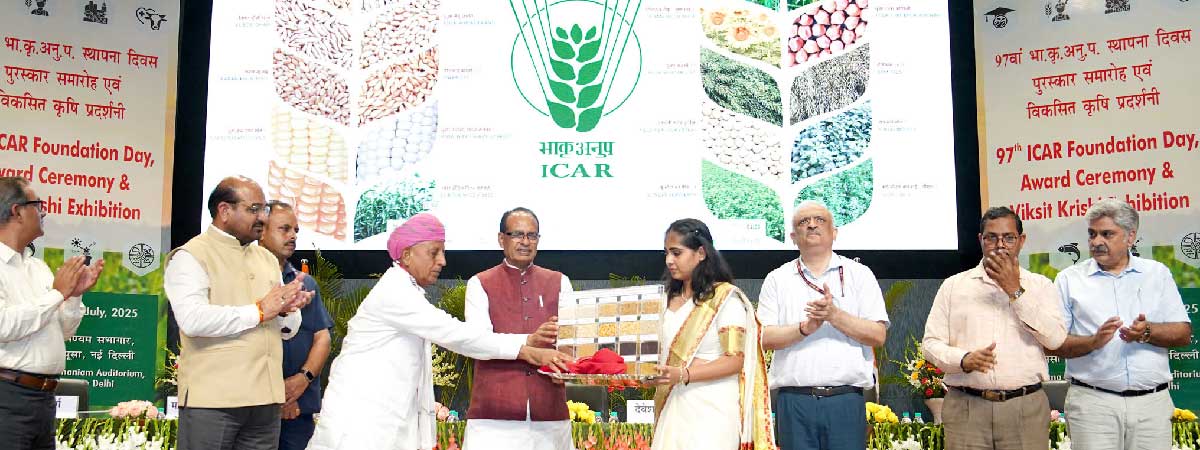On Wednesday, Union Minister for Agriculture, Farmers Welfare, and Rural Development, Shivraj Singh Chouhan commemorated the 97th Foundation Day of the Indian Council of Agricultural Research (ICAR) at the Bharat Ratna C. Subramaniam Auditorium, located in the NASC Complex, Pusa, New Delhi. Speaking to an audience comprising scientists, farmers, and officials, the minister praised ICAR’s pivotal role in transforming Indian agriculture, particularly under the leadership of Prime Minister Narendra Modi. He lauded the scientific community as “modern-day rishis,” emphasizing their unwavering commitment to the well-being of farmers.
During the ceremony, Shri Shivraj Singh Chouhan presented the National Agricultural Science Awards to distinguished scientists, recognizing the contributions of women researchers and young innovators in particular. He also inaugurated the Viksit Krishi Exhibition, which highlighted cutting-edge agricultural technologies, unveiled 10 new publications, and launched several Memoranda of Understanding (MoUs) to enhance research partnerships. The event saw the presence of Union Minister of State for Agriculture Bhagirath Choudhary, Agriculture Secretary Devesh Chaturvedi, ICAR Director General Dr. M.L. Jat, along with directors from various agricultural research institutes across the country.
Shri Chouhan extended his gratitude to ICAR on behalf of the 800 million Indians who rely on the public distribution system, as well as the international community that depends on Indian agricultural exports. He highlighted the Foundation Day as a significant and festive occasion, celebrating the nation’s agricultural progress. Applauding the scientific community, he commended their unmatched dedication to enhancing the welfare of farmers and advancing agricultural innovation.
Emphasizing India’s strides in agriculture, the minister pointed out that annual foodgrain production has increased significantly—from 3.9 million tonnes per year between 2000 and 2013 to 8.1 million tonnes annually from 2013 to 2025, marking a 2.5 to 3-fold surge. Similarly, horticulture output has grown by 7.5 million tonnes per year over the past 11 years, while milk production has seen a sharp rise—from 4.2 million tonnes annually (2000–2014) to 10.2 million tonnes (2014–2025). These remarkable gains, fueled by the adoption of advanced agricultural technologies, have strengthened the nation’s food reserves, enabled wheat exports, and created a growing demand for additional rice storage infrastructure.
Acknowledging the persistent challenges of climate change, fragmented landholdings, and pest outbreaks, Shri Chouhan praised the scientific community of ICAR for their role in sustaining India’s agricultural growth. He called on researchers to focus on promoting natural farming, improving the productivity of pulses and oilseeds, and designing compact farm machinery tailored to the needs of small and marginal farmers. The minister stressed that agricultural research should be farmer-centric, guided by ground realities rather than top-down directives from institutes based in Delhi.
The Viksit Krishi Sankalp Abhiyan, hailed as the world’s largest agricultural initiative, has outlined 500 priority research areas for targeted action, following crop-specific consultations on soybean, cotton, sugarcane, and maize. Addressing the issue of declining cotton yields—including setbacks in Bt cotton due to viral infestations—Shri Chouhan emphasized the need for joint efforts between ICAR and the agriculture ministry to develop effective, science-driven solutions.
To safeguard farmers from exploitation, Shri Chouhan announced plans to launch a toll-free grievance helpline and enforce strict measures against the sale of substandard seeds, fertilizers, and unauthorized bio-stimulants—highlighting that over 30,000 bio-stimulants are currently being sold without regulation. Letters have been dispatched to state Chief Ministers, urging them to take immediate corrective action. Additionally, he proposed the establishment of affordable fertilizer outlets, modeled on Jan Aushadhi Kendras, to ensure fair and accessible pricing for farmers across the country.



Comment here